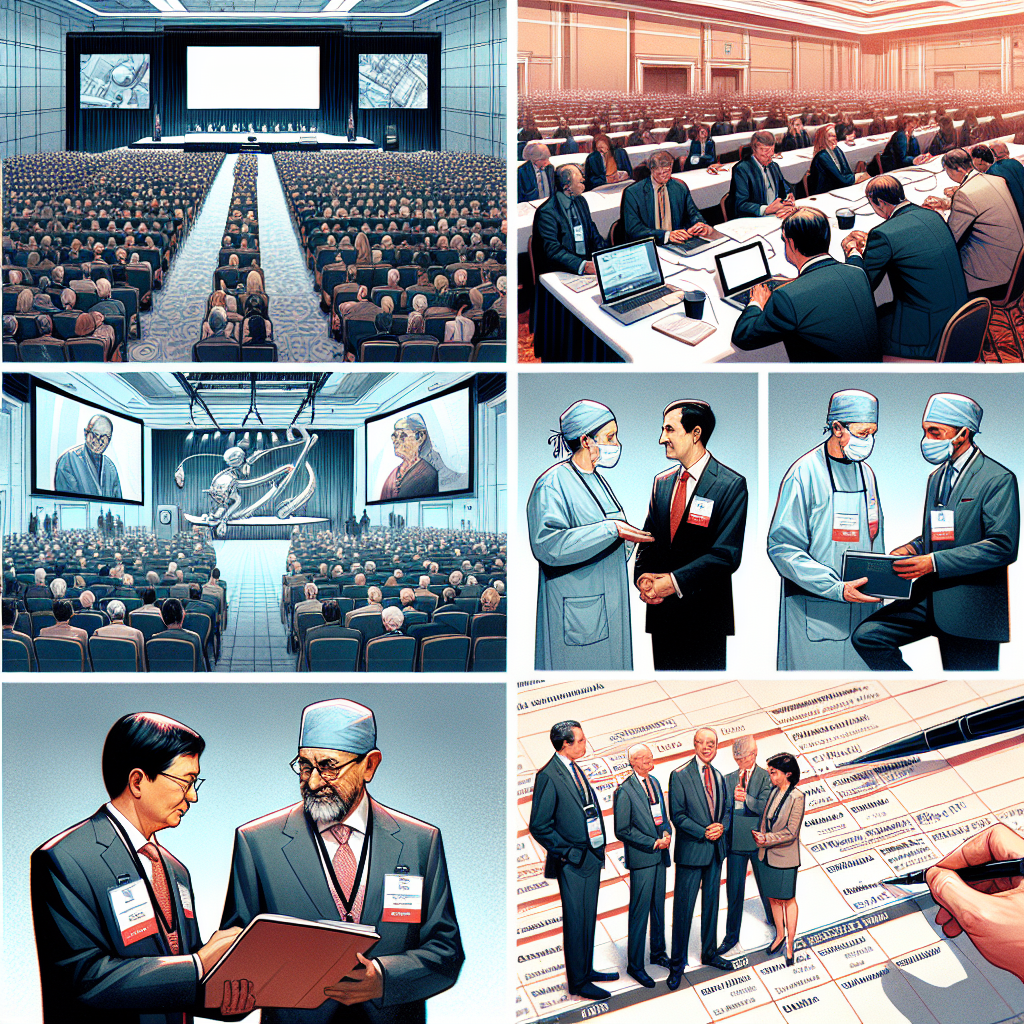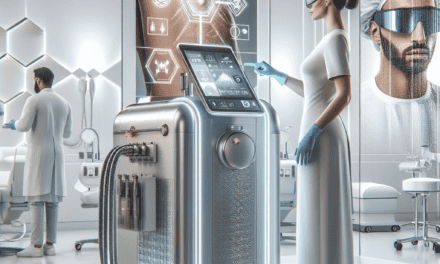Highlights from the ASPS 2024 Annual Meeting You Need to Know

The American Society of Plastic Surgeons (ASPS) Annual Meeting is a pivotal event in the field of plastic surgery, bringing together leading experts, practitioners, and researchers from around the globe. The 2024 meeting was no exception, offering a wealth of knowledge, innovative techniques, and groundbreaking research. This article delves into the key highlights from the ASPS 2024 Annual Meeting, providing valuable insights into the latest advancements and trends in plastic surgery.
1. Innovations in Reconstructive Surgery
Reconstructive surgery has always been a cornerstone of plastic surgery, and the 2024 ASPS Annual Meeting showcased several groundbreaking innovations in this field. These advancements are set to revolutionize patient outcomes and enhance the quality of life for individuals undergoing reconstructive procedures.
1.1 Advances in Microsurgical Techniques
Microsurgery has seen significant advancements, with new techniques improving precision and reducing recovery times. At the ASPS 2024, experts highlighted the use of augmented reality (AR) in microsurgical procedures. AR technology allows surgeons to overlay digital images onto the surgical field, providing real-time guidance and enhancing accuracy.
Case studies presented at the meeting demonstrated the successful application of AR in complex reconstructive surgeries, such as breast reconstruction post-mastectomy and limb reattachment. These studies showed a marked improvement in surgical outcomes, with reduced complications and faster recovery times.
1.2 3D Printing in Reconstructive Surgery
3D printing technology continues to make waves in reconstructive surgery. The ASPS 2024 meeting featured several sessions on the use of 3D-printed implants and prosthetics. Surgeons are now able to create custom implants tailored to the patient’s anatomy, resulting in better fit and function.
One notable example presented was the use of 3D-printed scaffolds for craniofacial reconstruction. These scaffolds provide a framework for bone regeneration, significantly improving the aesthetic and functional outcomes for patients with facial deformities.
1.3 Tissue Engineering and Regenerative Medicine
Tissue engineering and regenerative medicine are rapidly evolving fields that hold great promise for reconstructive surgery. At the ASPS 2024, researchers presented breakthroughs in the development of bioengineered tissues and organs.
One of the most exciting developments was the successful implantation of lab-grown skin grafts in burn patients. These grafts, created from the patient’s own cells, showed excellent integration and healing, reducing the risk of rejection and scarring.
1.4 Robotic-Assisted Surgery
Robotic-assisted surgery is becoming increasingly prevalent in reconstructive procedures. The precision and dexterity offered by robotic systems allow for minimally invasive techniques, reducing trauma and speeding up recovery.
During the ASPS 2024 meeting, several presentations highlighted the use of robotic systems in complex reconstructive surgeries, such as free flap transfers and nerve repairs. The results showed improved surgical outcomes and patient satisfaction.
1.5 Personalized Medicine in Reconstructive Surgery
Personalized medicine is transforming the approach to reconstructive surgery. By tailoring treatments to the individual patient’s genetic makeup and specific needs, surgeons can achieve better outcomes and minimize complications.
At the ASPS 2024, experts discussed the integration of genetic testing and biomarker analysis in reconstructive procedures. This approach allows for more precise planning and execution of surgeries, ultimately leading to improved patient satisfaction and quality of life.
2. Aesthetic Surgery: Trends and Techniques
Aesthetic surgery continues to evolve, with new trends and techniques emerging to meet the growing demand for cosmetic procedures. The ASPS 2024 Annual Meeting provided a platform for experts to share the latest advancements in aesthetic surgery, offering insights into the future of this dynamic field.
2.1 Non-Surgical Facial Rejuvenation
Non-surgical facial rejuvenation techniques have gained popularity due to their minimal downtime and natural-looking results. At the ASPS 2024, several sessions focused on the latest advancements in injectables, laser treatments, and other non-invasive procedures.
One of the key highlights was the introduction of a new generation of dermal fillers that offer longer-lasting results and improved safety profiles. These fillers are designed to integrate seamlessly with the skin, providing a more natural appearance.
2.2 Body Contouring Innovations
Body contouring procedures have seen significant advancements, with new techniques offering more precise and effective results. The ASPS 2024 meeting featured discussions on the latest innovations in liposuction, fat grafting, and skin tightening technologies.
One notable development was the introduction of a novel laser-assisted liposuction technique that allows for more targeted fat removal and skin tightening. This technique has shown promising results in terms of patient satisfaction and reduced recovery times.
2.3 Advances in Breast Augmentation
Breast augmentation remains one of the most popular cosmetic procedures, and the ASPS 2024 meeting highlighted several advancements in this area. New implant materials and techniques are enhancing the safety and aesthetic outcomes of breast augmentation surgeries.
Experts discussed the use of cohesive gel implants, which offer a more natural feel and reduced risk of complications. Additionally, the use of 3D imaging technology for preoperative planning is allowing for more precise implant placement and improved patient satisfaction.
2.4 Ethnic Considerations in Aesthetic Surgery
As the demand for aesthetic procedures continues to grow among diverse populations, understanding ethnic considerations in aesthetic surgery is becoming increasingly important. The ASPS 2024 meeting featured discussions on tailoring procedures to meet the unique needs of patients from different ethnic backgrounds.
Experts emphasized the importance of cultural sensitivity and individualized treatment plans to achieve optimal results. Case studies demonstrated successful outcomes in procedures such as rhinoplasty and eyelid surgery for patients of various ethnicities.
2.5 The Role of Technology in Aesthetic Surgery
Technology is playing an increasingly important role in aesthetic surgery, from preoperative planning to postoperative care. The ASPS 2024 meeting showcased several technological advancements that are enhancing the precision and safety of cosmetic procedures.
One notable example was the use of virtual reality (VR) for surgical simulations and patient consultations. VR technology allows patients to visualize potential outcomes and make informed decisions about their procedures, leading to higher satisfaction rates.
3. Patient Safety and Ethical Considerations
Patient safety and ethical considerations are paramount in the field of plastic surgery. The ASPS 2024 Annual Meeting addressed these critical issues, highlighting the importance of maintaining high standards of care and ethical practices in the industry.
3.1 Enhancing Surgical Safety Protocols
Ensuring patient safety is a top priority in plastic surgery, and the ASPS 2024 meeting emphasized the need for rigorous safety protocols. Experts discussed the implementation of standardized guidelines and checklists to minimize the risk of complications during surgical procedures.
Case studies presented at the meeting demonstrated the effectiveness of these protocols in reducing surgical errors and improving patient outcomes. The use of advanced monitoring technologies was also highlighted as a key factor in enhancing surgical safety.
3.2 Addressing Ethical Dilemmas in Plastic Surgery
Ethical dilemmas are an inherent part of plastic surgery, and the ASPS 2024 meeting provided a platform for discussing these complex issues. Topics such as informed consent, patient autonomy, and the ethical implications of emerging technologies were explored in depth.
Experts emphasized the importance of open communication and transparency with patients to ensure ethical decision-making. Case studies highlighted the challenges faced by surgeons in balancing patient desires with ethical considerations.
3.3 The Impact of Social Media on Patient Expectations
Social media has had a profound impact on patient expectations and perceptions of plastic surgery. The ASPS 2024 meeting addressed the challenges posed by unrealistic expectations fueled by social media platforms.
Experts discussed strategies for managing patient expectations and promoting realistic outcomes. The role of social media influencers and the ethical considerations surrounding their endorsements of cosmetic procedures were also explored.
3.4 Legal Considerations in Plastic Surgery
Legal considerations are an important aspect of plastic surgery practice. The ASPS 2024 meeting featured discussions on the legal challenges faced by plastic surgeons, including malpractice claims and regulatory compliance.
Experts provided insights into risk management strategies and the importance of maintaining comprehensive documentation. Case studies highlighted the legal implications of emerging technologies and the need for updated regulations.
3.5 Promoting Diversity and Inclusion in Plastic Surgery
Diversity and inclusion are critical issues in the field of plastic surgery. The ASPS 2024 meeting emphasized the importance of promoting diversity among practitioners and ensuring equitable access to care for all patients.
Experts discussed initiatives aimed at increasing diversity in plastic surgery training programs and addressing disparities in patient outcomes. Case studies highlighted successful efforts to promote inclusivity and cultural competence in plastic surgery practice.
4. Research and Education: Shaping the Future of Plastic Surgery
Research and education are essential components of advancing the field of plastic surgery. The ASPS 2024 Annual Meeting highlighted the latest research findings and educational initiatives that are shaping the future of the industry.
4.1 Breakthrough Research in Plastic Surgery
The ASPS 2024 meeting featured presentations on groundbreaking research that is pushing the boundaries of plastic surgery. Topics ranged from novel surgical techniques to advancements in regenerative medicine and tissue engineering.
One notable study presented at the meeting focused on the use of stem cells for tissue regeneration. The research demonstrated the potential of stem cell therapy in improving wound healing and reducing scarring in reconstructive procedures.
4.2 Innovations in Surgical Education
Advancements in surgical education are playing a crucial role in training the next generation of plastic surgeons. The ASPS 2024 meeting showcased innovative educational tools and techniques that are enhancing surgical training.
One example was the use of virtual reality (VR) simulations for surgical training. VR technology allows trainees to practice complex procedures in a risk-free environment, improving their skills and confidence before performing surgeries on patients.
4.3 Collaborative Research Initiatives
Collaboration is key to advancing research in plastic surgery. The ASPS 2024 meeting highlighted several collaborative research initiatives that are driving innovation and improving patient outcomes.
Experts discussed the importance of interdisciplinary collaboration and the sharing of data and resources. Case studies demonstrated the success of collaborative efforts in developing new surgical techniques and improving patient care.
4.4 The Role of Continuing Education in Plastic Surgery
Continuing education is essential for plastic surgeons to stay updated on the latest advancements and maintain high standards of care. The ASPS 2024 meeting emphasized the importance of lifelong learning and professional development.
Experts discussed the availability of online courses, workshops, and conferences that provide opportunities for continuing education. The role of mentorship and peer-to-peer learning in professional development was also highlighted.
4.5 The Future of Plastic Surgery Research
The future of plastic surgery research is promising, with ongoing advancements in technology and scientific understanding. The ASPS 2024 meeting provided insights into the future directions of research in the field.
Experts discussed emerging areas of research, such as personalized medicine, artificial intelligence, and nanotechnology. The potential impact of these advancements on patient care and surgical outcomes was explored in depth.
5. Global Perspectives on Plastic Surgery
The ASPS 2024 Annual Meeting provided a platform for sharing global perspectives on plastic surgery, highlighting the diverse approaches and challenges faced by practitioners around the world.
5.1 International Collaborations in Plastic Surgery
International collaborations are playing a crucial role in advancing plastic surgery on a global scale. The ASPS 2024 meeting featured discussions on successful collaborative efforts between countries and regions.
Experts highlighted the benefits of sharing knowledge and resources across borders, leading to improved patient outcomes and the development of innovative techniques. Case studies demonstrated the success of international partnerships in addressing global health challenges.
5.2 Addressing Global Health Disparities
Global health disparities remain a significant challenge in plastic surgery. The ASPS 2024 meeting addressed the need for equitable access to care and the importance of addressing disparities in patient outcomes.
Experts discussed initiatives aimed at improving access to plastic surgery services in underserved regions. Case studies highlighted successful efforts to provide training and resources to practitioners in low-resource settings.
5.3 Cultural Considerations in Plastic Surgery
Cultural considerations play a crucial role in plastic surgery practice, particularly in diverse regions. The ASPS 2024 meeting emphasized the importance of cultural competence and sensitivity in providing patient-centered care.
Experts discussed strategies for understanding and respecting cultural differences in patient preferences and expectations. Case studies demonstrated successful outcomes in culturally sensitive procedures, such as ethnic rhinoplasty and body contouring.
5.4 The Impact of Globalization on Plastic Surgery
Globalization is having a profound impact on the field of plastic surgery, with increased cross-border travel for cosmetic procedures. The ASPS 2024 meeting addressed the challenges and opportunities posed by medical tourism.
Experts discussed the importance of ensuring patient safety and quality of care in international settings. The role of accreditation and certification in promoting safe practices in medical tourism was also explored.
5.5 The Future of Plastic Surgery on a Global Scale
The future of plastic surgery on a global scale is promising, with ongoing advancements in technology and international collaboration. The ASPS 2024 meeting provided insights into the future directions of the field.
Experts discussed emerging trends and challenges in global plastic surgery, such as the impact of climate change on surgical practice and the role of telemedicine in expanding access to care. The potential for global partnerships to drive innovation and improve patient outcomes was also explored.
Conclusion
The ASPS 2024 Annual Meeting provided a comprehensive overview of the latest advancements and trends in plastic surgery. From innovations in reconstructive and aesthetic surgery to discussions on patient safety, ethical considerations, and global perspectives, the meeting highlighted the dynamic nature of the field.
As plastic surgery continues to evolve, it is essential for practitioners to stay informed about the latest developments and maintain high standards of care. The insights gained from the ASPS 2024 meeting will undoubtedly shape the future of plastic surgery, leading to improved patient outcomes and enhanced quality of life for individuals around the world.





